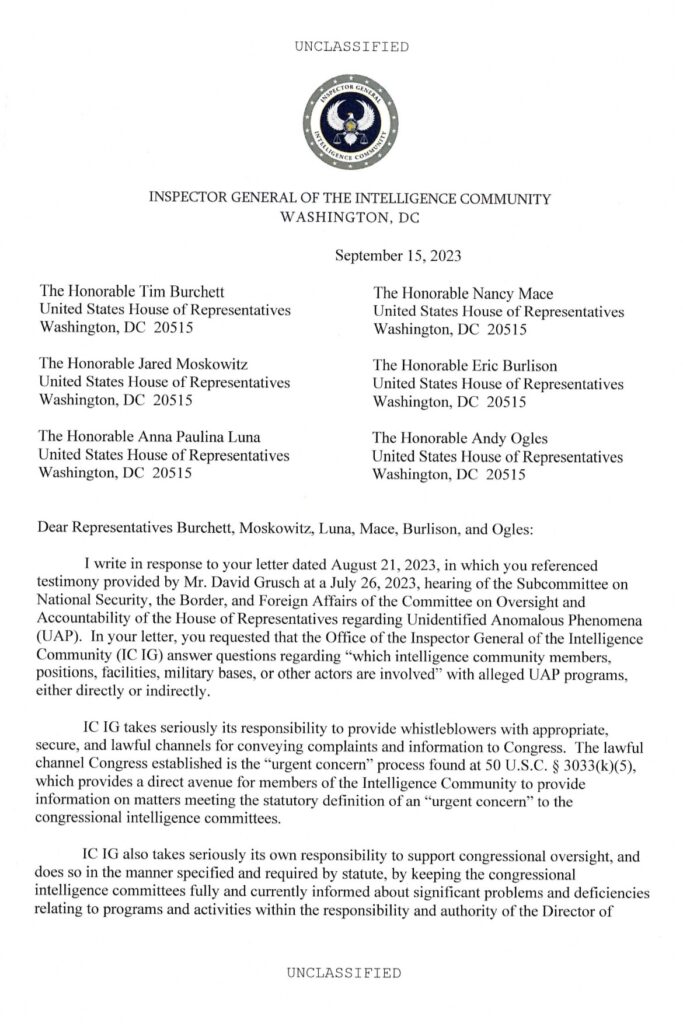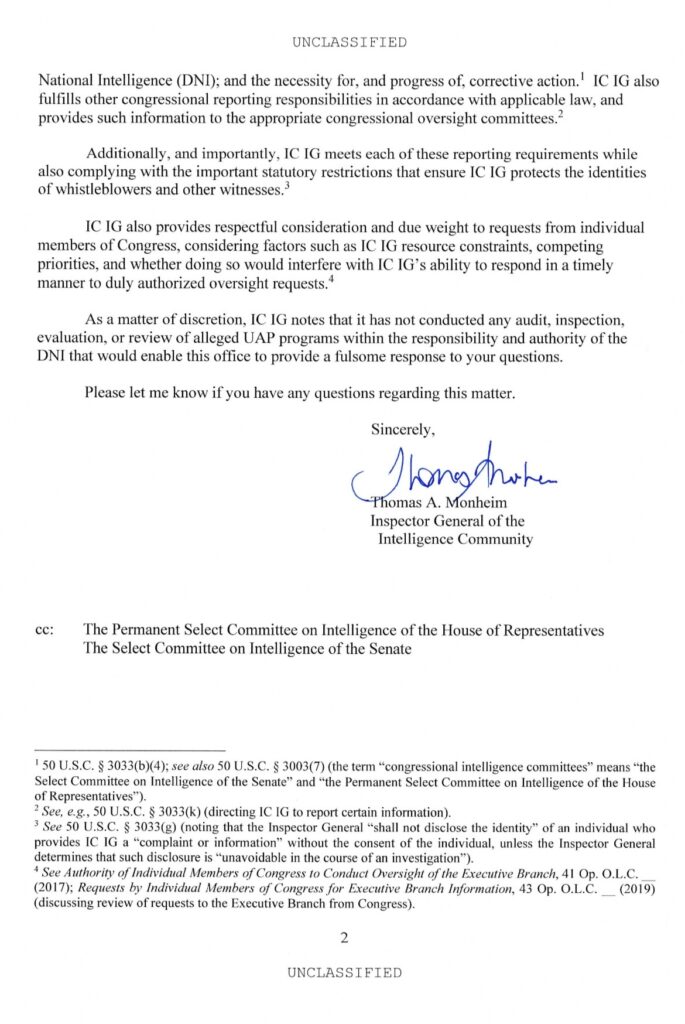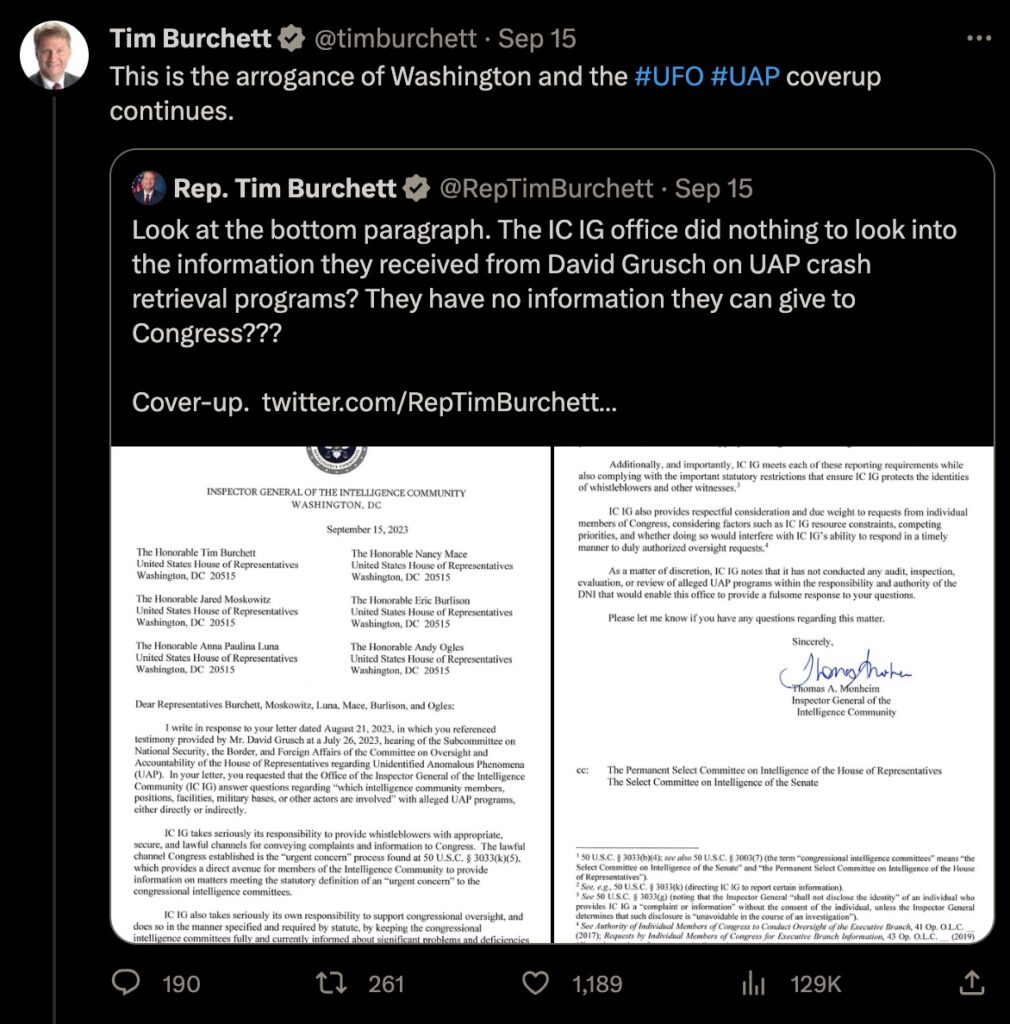Rep. Tim Burchett declared there’s a “cover-up” after a key intel watchdog recently stated that they have not reviewed or audited any alleged UAP programs. However, the ICIG’s letter left a big clue that many missed. And this clue might be implying that a secret UFO investigation is happening after all.
Burchett received the letter after he and a cohort of congressmen asked the Inspector General of the Intelligence Community (ICIG) for an update on UFO whistleblower David Grusch’s claims. Grusch has alleged that the United States has a secret UFO reverse engineering and retrieval program it’s hiding from Congress, and Grusch has faced illegal reprisals for bringing the claims forward.
The confusing letter from the ICIG, Thomas A. Monheim, has left members of Congress and the UFO community with more questions than answers. However, the exact wording of the letter lends itself to an interpretation that might imply an active investigation is indeed happening. Here’s an in-depth look at exactly why.
To review a comprehensive, in-depth breakdown of all of Grusch’s claims, with citations, see our story here.
Read the Full ICIG Letter Below
The full letter from Monheim, the ICIG, can be read below. It was shared on X (formerly Twitter) by Burchett.

Here’s page 2 of the unclassified letter:

The letter is a response to a letter that Rep. Burchett, Rep. Jared Moskowitz, Rep. Anna Paulina Luna, Rep. Nancy Mace, Rep. Eric Burlison, and Rep. Andy Ogles sent on August 21. So notably, it took nearly a month to respond. The letter begins by noting that the representatives referenced Grusch’s House testimony on July 26.
“You requested that the Office (of the ICIG) … answer questions regarding ‘which intelligence community members, positions, facilities, military bases, or other actors are involved” with alleged UAP programs, either directly or indirectly.”
The ICIG, Monheim, begins with a general discussion of the ICIG’s role with whistleblower allegations.
“IC IG takes seriously its responsibility to provide whistleblowers with appropriate, secure, and lawful channels for conveying complaints and information to Congress. The lawful channel Congress established is the ‘urgent concern’ process found at 50 U.S.C. § 3033(k)(5), which provides a direct avenue for members of the Intelligence Community to provide information on matters meeting the statutory definition of an ‘urgent concern’ to the congressional intelligence committees.”
The note then goes on to discuss its responsibility in the area of congressional oversight, noting:
“IC IG also takes seriously its own responsibility to support congressional oversight, and does so in the manner specified and required by statute, by keeping the congressional intelligence committees fully and currently informed about significant problems and deficiencies relating to programs and activities within the responsibility and authority of the Director of National Intelligence (DNI); and the necessity for, and progress of, corrective action.’ IC IG also fulfills other congressional reporting responsibilities in accordance with applicable law, and provides such information to the appropriate congressional oversight committees. Additionally, and importantly, IC IG meets each of these reporting requirements while also complying with the important statutory restrictions that ensure IC IG protects the identities of whistleblowers and other witnesses.”
The letter then goes on to note what the ICIG’s role is when it comes to congressional requests.
“IC IG also provides respectful consideration and due weight to requests from individual members of Congress, considering factors such as IC IG resource constraints, competing priorities, and whether doing so would interfere with IC IG’s ability to respond in a timely manner to duly authorized oversight requests.”
In the Last Paragraph, the ICIG Said It Had Not Conducted Any ‘Audit, Inspection, Evaluation, or Review’ of Certain UAP Programs
It’s the last paragraph in the letter that has caused the most confusion, discussion, and speculation.
“As a matter of discretion, IC IG notes that it has not conducted any audit, inspection, evaluation, or review of alleged UAP programs within the responsibility and authority of the DNI that would enable this office to provide a fulsome response to your questions. Please let me know if you have any questions regarding this matter.”
It’s worth noting that the letter specifically notes they have not reviewed any alleged programs under the DNI’s authority.
Burchett shared the entire letter on Twitter (now called X) and wrote: “The IC IG office did nothing to look into the information they received from David Grusch on UAP crash retrieval programs? They have no information they can give to Congress??? Cover-up.”

Burchett was clearly displeased by the letter. But is it really as bad as it sounds at first read? Perhaps not.
The ICIG’s Letter Pointedly Left Out ‘Investigation,’ Which Is One of the ICIG’s Major Spelled Out Duties
Interestingly, @issa_jag on Twitter pointed out that the ICIG’s organizational structure (which is listed on the ODNI’s website) includes an audit division, an investigations division, an inspections and evaluations division, a mission support division, a center for protected disclosures division, and counsel. And a closer look at how the ICIG describes itself (and related laws) reveals that this investigations division is very imporant — and the fact that the ICIG letter left out the word “investigation” could be quite telling.
It could very well be quite notable that the ICIG wrote that “it has not conducted any audit, inspection, evaluation, or review,” seemingly naming every division but investigations.
A stronger clue can be found on another DNI webpage called “Office of the Intelligence Community Inspector General.” This short webpage notes: “In accordance with Title 50 U.S.C.A. Section 3033, the Inspector General of the Intelligence Community (IC IG) conducts independent and objective audits, investigations, inspections, and reviews to promote economy, efficiency, effectiveness, and integration across the Intelligence Community.”
The webpage lists “audits, investigations, inspections, and review,” while the ICIG’s letter lists “audit, inspection, evaluation, or review” (remember, its inspection division is an Inspections and Evaluations division.) Title 50 U.S.C.A. Section 3033 consistently lists “audits, investigations, inspections, and reviews” throughout its verbiage describing the ICIG’s responsibility.
The wording is also seen here on another official Oversight.gov website, where they note: “The Inspector General of the Intelligence Community (ICIG) conducts independent and objective audits, investigations, inspections, and reviews to promote economy, efficiency, effectiveness, and integration across the Intelligence Community.”
While “evaluations” isn’t listed on these websites, the ICIG list evaluations as part of its “inspections and evaluations” division. So it’s quite possible that under the ICIG’s closely knit definitions, an investigation is indeed happening, but not an audit, inspection and evaluation, or review.
The SemiAnnual Report that the ICIG releases regularly also seems to back up this theory. For example, the October 2022-March 2023 PDF notes that the Audit Division conducts “audits and reviews” (so there’s where the “review” verbiage in the ICIG’s letter comes from), and the Inspections and Evaluations division conducts “systematic and independent inspections and evaluations.”
Meanwhile, the Investigations Division conducts:
“Proactive and reactive criminal and administrative investigations, including those arising from complaints or information from any person concerning the existence of an activity within the authorities and responsibilities of the DNI constituting a violation of laws, rules, or regulations; or mismanagement, gross waste of funds, abuse of authority, or a substantial and specific danger to the public health and safety. The division also plays a principal role in tracking, monitoring, and investigating unauthorized disclosures of classified information. The division identifies and reports internal control weaknesses that could render ODNI or other IC programs and systems vulnerable to exploitation, or that could be used for illicit activity.”
Of even more important note, however, is where the DNI notes that it is the ICIG’s Investigations Division that has special statutory authority to investigate the DNI.
The ICIG’s semiannual report notes: “The Investigations Division’s unique statutory authority to investigate programs and activities within the authorities and responsibilities of the DNI allows it to partner with, and provide assistance to, other Offices of Inspector General conducting investigations concerning IC programs and activities.”
Recall that the ICIG’s letter specifically said: “As a matter of discretion, IC IG notes that it has not conducted any audit, inspection, evaluation, or review of alleged UAP programs within the responsibility and authority of the DNI that would enable this office to provide a fulsome response to your questions.”
It’s entirely possible that the DNI investigation is indeed happening, but perhaps at a classified level that does not allow its disclosure within the ICIG’s letter to congressmen who may not have enough clearance.
From October 2022 to March 2023, the ICIG completed two reprisal investigations and has a number of reprisal investigations ongoing. It’s also conducting seven joint investigations of “potential offenses such as fraud, unauthorized disclosure, counterintelligence, intelligence oversight, procurement fraud, and contractor misconduct.” And the investigations division “has 39 open investigations and has issued 8 investigative reports this reporting period.” These open investigations include contract and procurement fraud, contractor cost mischarging, contractor misconduct, abuse of authority, procurement matters, and more.
If you want an idea of how the ICIG’s departments work, you can view the most recent semiannual report below.
ICIG Semiannual Report – Unclassified by Stephanie Dube Dwilson on Scribd
Could this be hopium? Maybe. But it seems quite telling that “investigation” was left out of the ICIG’s letter, possibly on purpose. But why didn’t they just say that they were investigating the claims? Perhaps the classified nature prevented him from doing so?
Some See the Letter as Negative, Others View It More Optimistically
Reactions to the letter are mixed. Some, like Burchett, see this as clearly being a bad sign that an investigation into Grusch’s allegations is not happening.
Others are offering there own interpretations. On X (Twitter), Phosdisclosure offered the following thought: “@timburchett as it was deemed credible and urgent the ICIG passed this onto the DNI (this is normal). This is why they didn’t investigate. Your letter was pushing the ICIG for names and places etc but as they had no part in investigating they clearly can’t confirm anything.”
Also on Twitter/X, John Bridges, a physicist and UAP enthusiast, suggested that perhaps the actual inspection would be done by the inspector general for the relevant departments, such as the Office of the Navy Inspector General (ONIG) or the Department of Defense Inspector General.
Bridges continued, writing: “Again lack of clarity about this is surely a red flag? TB et al asked the wrong questions – they drove head on at the train – instead of just asking for confirmation that DG was indeed publically conveying the same information as he gave the IG.”
You can also read a detailed discussion with other theories on Reddit here. One of the suggestions is that the ICIG, by copying the House and Senate intelligence communities at the end of the letter, is noting that he can only reveal findings and answers to them.
What do you think? Let us know in the comments below.
This work by Stephanie Dwilson is licensed under CC BY-ND 4.0. Please note that this license does not include photos or videos that may be in the story.

